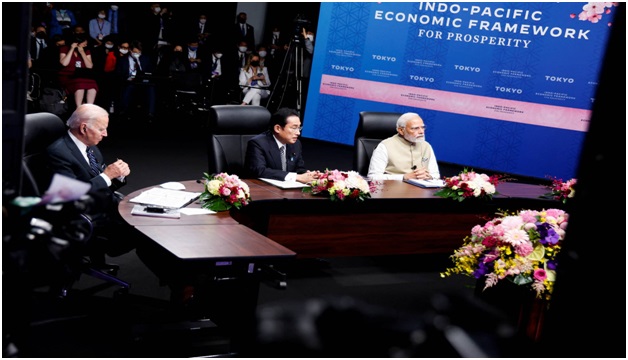Indo-Pacific Economic Framework (IPEF) (Indian Express)

- 16 Nov 2023
Why in the News?
India, the US, and 12 other members of the Indo-Pacific Economic Framework (IPEF) on Wednesday entered into a supply chain resilience agreement that aims to cut dependence on China and help shift manufacturing of crucial goods to member nations.
About Indo-Pacific Economic Framework for Prosperity (IPEF):
- The Indo-Pacific Economic Framework (IPEF) is an economic initiative launched by U.S. President Joe Biden in Tokyo on May 23, 2022.
- The framework aims to strengthen economic cooperation among countries in the Indo-Pacific region, which is home to over 40% of the world's population and generates nearly 60% of global GDP.
- Except Cambodia, Laos, and Myanmar, other Southeast Asian nations are a part of the IPEF.
- It has currently 14 members including Australia, Brunei Darussalam, Fiji, India, Indonesia, Japan, the Republic of Korea, Malaysia, New Zealand, Philippines, Singapore, Thailand, the United States, and Vietnam.
- The IPEF has four pillars:
- Trade;
- supply chains;
- clean energy, decarbonisation and infrastructure;
- tax and anti-corruption.
- IPEF Significance: The IPEF is a significant development in the Indo-Pacific region.
- It is the first major economic initiative launched by the United States in the region since the Trans-Pacific Partnership (TPP) negotiations collapsed in 2017.
- The IPEF is also unique in that it is open to all countries in the Indo-Pacific region, regardless of their economic development level.
- India and IPEF: India has been actively involved in the Indo-Pacific Economic Framework (IPEF) since its launch in May 2022.
- The country has joined three of the four pillars of the framework: supply chains, clean energy, and fair economy.
- However, India has not yet joined the trade pillar, which is the most sensitive and contentious pillar of the framework.
- There are a number of reasons why India has been hesitant to join the trade pillar.
- One concern is that the pillar could lead to tariff cuts on agricultural products, which would harm Indian farmers.
- India is also concerned about the potential for the trade pillar to lead to increased data flows, which could raise privacy concerns.
